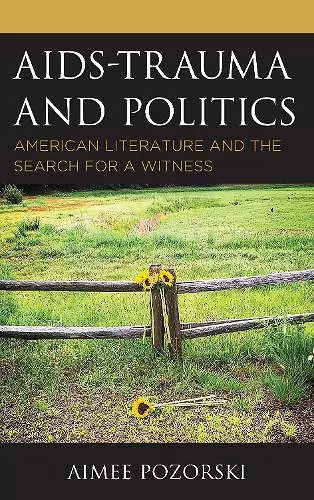AIDS-Trauma and Politics
American Literature and the Search for a Witness
Format:Hardback
Publisher:Bloomsbury Publishing PLC
Published:26th Jun '19
Currently unavailable, and unfortunately no date known when it will be back

AIDS-Trauma and Politics considers American literary representations of the social and political silence surrounding the AIDS crisis in the U.S. in the 1980s. The book offers close readings of such authors as Paul Monette, Mark Doty, Rafael Campo, Sarah Schulman, Tony Kushner, and Larry Kramer in order to argue that the AIDS crisis was born largely without a witness and, as a result, marks a significant trauma in U.S. history. Grounded by trauma studies, AIDS-Trauma and Politics argues that the arts, exemplified here by literature and film, uniquely underscore social problems otherwise overlooked by such discourses as politics, the law, and journalism. Defining the 1980s AIDS crisis as a perfect case, this book proposes to redefine trauma not simply as an event that happened too soon, but rather as an ongoing series of oversights resulting in a failure to acknowledge or witness the humanity of those who suffer.
In her insightful monograph, AIDS—Trauma and Politics, Aimee Pozorski looks forward, first by looking back at literary and cinematic representations in the early days of the epidemic, then by engaging with recent works. Like Hagar looking up in her distress to see the well, Pozorski finds qualified hope in the efforts of emerging voices to address the ongoing “epidemic of signification” that persists nearly 40 years into the HIV/AIDS era. This book is a must-read for those interested not only in the literature of HIV/AIDS, but in the resurgence of trauma theory alongside the emerging field of narrative medicine. -- Michael Broder, publisher, Indolent Arts Foundation
A welcome addition to the conversation about the literary response to AIDS, this book recognizes that the crisis has often seen more reaction in writing than in medicine or politics. While addressing forgiveness, lament, atonement, activism, militancy, witnessing, and remembering in both known and lesser known AIDS crisis authors, AIDS-Trauma and Politics also strikingly rescues militarism as an AIDS metaphor – and indeed also rescues metaphor as an appropriate and useful response to AIDS. A wide-ranging consideration from the mainstream to the eclectic, taking into account what, in Pozorski’s own words, “does not fit exactly,” to mine what is meaningful in AIDS writing and representation. -- Monica Pearl, University of Manchester
Aimee Pozorski‘s beautifully written book insightfully combines perspectives from the medical humanities and trauma studies to shed light on how literary explorations of AIDS-trauma seek to create an empathic and ethical response to human suffering, criticizing and amending the silence and distance of political leaders and medical professionals at the time of their writing. Aimee Pozorski‘s attentive readings of journalism, poetry, plays, short stories, comics, and many other artistic responses to trauma demonstrate the value of looking closely at language and theorize what literary language, in particular, has to contribute to human rights discourses, while also teaching us what it might mean to read ethically in literary criticism. -- Maren Scheurer, Goethe University Frankfurt
"In AIDS-Trauma and Politics Aimee Pozorski makes a deeply humane, eloquently argued case for the necessity of literature as a pre-eminent, unique artistic response to chronic illness. Meticulously researched and intellectually ambitious, Pozorski's book moves across multiple literary forms to expose the powerful contemporary relevance of works by both canonical writers such as Tony Kushner, Susan Sontag and Larry Kramer and lesser-known ones including Dennis Ciscel and Michael Broder. Through sensitive, lucid and astute close textual analyses of numerous texts, she makes a richly insightful and deeply empathetic contribution to the scholarship on AIDS literature, trauma theory, ethical witnessing and narrative medicine". -- Ruth Maxey, University of Nottingham
ISBN: 9781498568081
Dimensions: 239mm x 159mm x 20mm
Weight: 454g
184 pages